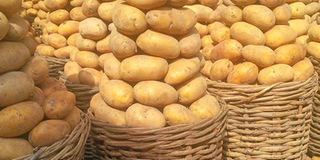Refining the Irish potato value chain

Irish potatoes are the second most important food crop in Kenya. PHOTO | COURTESY
What you need to know:
- The new regulations seek to put in place measures to improve standards and streamline stakeholder operations in the Irish potato value chain.
- Mr Kiunjuri said the ministry is committed to implementing and enforcing the regulations with the support of all stakeholders.
Kenya’s drive to improve food and nutrition security has received a major boost following the launch of Irish potato regulations.
The new regulations seek to put in place measures to improve standards and streamline stakeholder operations in the Irish potato value chain.
Agriculture Cabinet Secretary Mwangi Kiunjuri, while launching the regulations in May, said the move will increase Kenya’s annual production of Irish potatoes from 1.3 million tonnes to six million tonnes by the year 2022.
The ministry developed the Crops (Irish Potato) Regulations, 2019 to provide a supportive policy environment, one that addresses constraints and challenges in the sub-sector.
This is because marketing quality produce has been a challenge. The use of extended bags exploits farmers and reduces the quality of potatoes reaching the consumer.
SUPPORT
Moreover, the industry suffers inadequate certified seeds, poor market infrastructure, post-harvest losses, limited mechanisation, and pests and diseases.
These, Mr Kiunjuri said, will be addressed through enforcement of the new regulations.
Among the benefits that the Crops (Irish Potato) Regulations, 2019 will realise include: increased yields of Irish potatoes, fuelled by increased demand for appropriate seed and inputs; increased private investments in seed production, potato production, warehousing, agro-processing and marketing of potatoes; and increased savings and investments by farming families.
The regulations bear much promise in streamlining production, trade and interactions among key players in the sub-sector.
Mr Kiunjuri said the ministry is committed to implementing and enforcing the regulations with the support of all stakeholders.
IRRIGATION
His Principal Secretary, Prof Hamadi Boga, said the enactment and enforcement of crop regulations is in support of the Big Four agenda.
Prof Boga added that the ministry is facilitating private seed multipliers to use idle arable land from public institutions as a way of increasing acreage under seed potato.
Additionally, irrigated land under Irish potatoes will be expanded.
The development of the Crops (Irish Potato) Regulations, 2019, he said, went through a rigorous consultative and participatory process involving the counties and other stakeholders.
Lack of regulations, he added, had led to inequitable distribution of benefits along the value chain through uncontrolled and disorganised activities.
PRODUCTIVITY
The interim Director General of Agriculture and Food Authority (Afa), Mr Anthony Muriithi, said the Authority is developing crop regulations to accelerate the sector’s growth and development.
This will enhance productivity and the incomes of farmers and other actors, improve the investment climate and efficiency of agribusiness, and develop agricultural crops through promotion of production, processing, marketing and distribution in suitable areas of the country.
Afa is a state corporation established through an Act of Parliament, specifically, under section 3 of the AFA Act No. 13 of 2013.
Its vision is to be a world class regulator in the agriculture sector, and the mission is to sustainably develop and promote scheduled crops value chains through effective regulation, for economic growth.
Mr Leonard Kubok, Head of Food Crops Directorate at Afa, pointed out that Irish potatoes are the second most important food crop in Kenya, competing favourably with maize.
REVENUE
The crop is cultivated by close to one million growers as a food and cash crop.
It is, thus, a significant food security and cash crop that contributes considerably to the country’s gross domestic product (GDP).
At least 15 counties grow this crop, producing about 1.3 million tonnes from about 150,000 hectares of land, mainly under rain-fed farming.
The food crops sub-sector has largely been unregulated since independence. The development of the Crops (Irish Potato) Regulations, 2019 is therefore a big milestone to the potato sub-sector.
The regulations largely provide for:
• Registration of the growers and all the value chain players to facilitate effective planning of the sub-sector programmes by both county and national governments.
• Safe use, storage and disposal of registered pest control products in the production of the Irish potatoes.
• Packaging of Irish potato produce in clean food grade material in a maximum weight of 50kg per single unit.
• Sorting, grading, packaging, labelling, transporting, and storing as per national, regional and international standards.
The regulations further make provisions for the appointment of inspectors to enforce their implementation.


